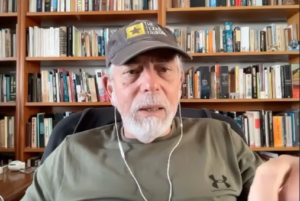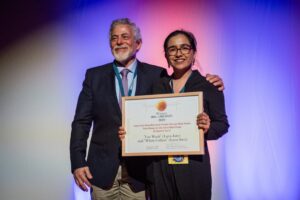Gustavo Gorriti understands the attacks he and Peruvian investigative outlet IDL-Reporteros are currently facing as a threat not only to him, but to journalism in general, and to a greater extent to democracy.
His fight, he explains, is not only for his work, but also so that in the future other generations of journalists can fulfill that role.
“One of the lessons is that journalism must fight for democracy to survive, for it to exist, and must not have any shame in openly defending it. And history is full of examples of what it means to have been careless,” Gorriti, founder and director of IDL-Repoteros, told LatAm Journalism Review (LJR).

Gustavo Gorriti founded IDL-Reporteros in 2009 in Lima, Peru. (Screenshot from interview)
“And the second thing is that investigative journalism in these societies has a cost. When you discover the misdeeds of the powerful who have means at their disposal, they will respond, they will respond, you will receive everything from threats to attacks. So an integral part of the exercise of investigative journalism must be planning an effective defense of the investigation and of journalism itself.”
Gorriti is currently facing an open criminal investigation from the Peruvian prosecutor’s office for alleged bribery. The case includes two prosecutors who at the time handled investigations into the multinational scandal known as Lava Jato, or Operation Car Wash. As Gorriti explained to LJR, the prosecution said the journalist received privileged information from the two in exchange for “very good press.”
Based on this, the prosecutor's office is requesting the “lifting of secrecy” of Gorriti's communications. It is because of this request that both the journalist and IDL-Reporteros, as well as international and national organizations, have said that the investigation opened by the prosecutor's office is retaliation for his investigations.
As they have in other legal investigations resulting from their reporting, Gorriti and IDL-Reporteros said they will not reveal their sources, despite the criminal investigation, smear and disinformation campaigns against them and attacks on their newsroom.
As Gorriti reiterated to LJR, he has said that he will fight to the last consequences and that he will not hand over his communications or his sources. And even if he had to go to jail, he would do it.
“If they want to force us to do it, whatever the price, we are not going to do it. I say this without conditions, whatever the price,” Gorriti said. “Now, that we are going to passively accept whatever punishment these gangsters decide to impose, that is not the case either.”
LJR contacted the prosecutor’s office multiple times, but had still not received a reply at the time of publication.
Investigations and attacks
IDL-Reporteros first published an investigation into the contracts of Brazilian construction company Odebrecht with the Peruvian government in 2011. They could not have imagined the size of the scandal it would become, not only in the Andean country, but in the entire region.
Together with other media outlets in the country, they managed to reveal a great scheme that “has involved all the former presidents since the return of democracy to Peru,” said Romina Mella, editor-in-chief of IDL-Reporteros, during the last Ibero-American Colloquium on Digital Journalism, organized by the Knight Center.
Yet, IDL-Reporteros has broken many high-profile stories in its 14 years of existence – which often touched people in powerful places.
According to Zuliana Lainez, president of Peru’s National Association of Journalists (ANP, for its acronym in Spanish), “the biggest case of corruption in the justice system in recent years” in Peru was uncovered by Gorriti and IDL-Reporteros. The journalistic investigation known as “Los cuellos blancos del puerto” (The white collars of the port) reported how prosecutors and judges were allegedly involved in illicit actions that ranged from influence peddling, cheating in exams for judges and prosecutors and even manipulation of sentences. As a consequence, Lainez said, there was a great public mobilization.
As she explained, the 20 years that the ANP has monitored press freedom in Peru allows it to confirm that what is happening now to Gorriti and IDL-Reporteros is an “unprecedented attack.”
“It is not just the latest decision of the prosecutor's office, it is an entire campaign of harassment and stigmatization that they have been suffering for years,” Lainez said.
According to its records, in the last five years there has not been an annual report from the ANP in which cases of attacks or aggression against IDL-Reporteros or Gorriti have not appeared.
Some of these attacks, perhaps the best known, have to do with those carried out by far-right groups, such as La Resistencia. According to complaints from the IDL-Reporteros team and registered by organizations like the ANP, members of La Resistencia constantly attack the media outlet's headquarters, and on some occasions they have even gone to Gorriti's home. There they hold noisy demonstrations, attack headquarters with objects and have even thrown excrement.
“Everything with total impunity,” Gorriti said, explaining how the authorities do little to stop them. As Gorriti said the authorities explained, the actions of this group are protected by freedom of expression.
They also face disinformation campaigns in which Gorriti and IDL-Reporteros are usually accused of various crimes, such as having threatened the country's attorney general, or bribery, or of planning investigations carried out by the prosecutor's office, among others.
“This opening of the investigation [by the prosecutor’s office] simply ends what has been one of the largest offensives to discredit investigative journalism, the largest that I have seen in the world,” Gorriti said. “I have not seen a campaign [like this] in which so many resources have been allocated.”
In the face of attacks, more journalism
Gorriti, Mella and the IDL-Reporteros team have responded to the attacks with what they do best: journalism.
Mella told LJR that they have taken advantage of the different attacks against them - from physical attacks on their headquarters to smear campaigns, to investigate what is behind them. Thus, for example, she said they have found that the financing received by groups such as La Resistencia is allegedly from conservative groups and politicians mentioned in different journalistic investigations.
Likewise, IDL-Reporteros said it found coordination between the violent attacks by far-right groups and smear campaigns against the investigative site that go viral not only on social networks, but even in the media.

Gustavo Gorriti and Romina Mella receive the Global Shining Light Award for investigations about Operation Car Wash, and alleged judicial corruption. (Courtesy)
“At a certain point we worked to dismantle the disinformation campaigns against us,” Mella said. “And in the midst of reporting on the attacks and disinformation, we were able to establish at a certain moment the connections and coordination that existed between the massive dissemination through disinformation campaigns with this type of attack, such as street harassment. And how these are organized and articulated with political groups, businessmen, actors who are involved in corruption cases that IDL-Reporteros has published about in recent years.”
The smear campaigns and all the disinformation that circulates in them are also subject to verification by IDL-Reporteros. And they have gone further: not only do they debunk them, but they also take the opportunity to once again make known their investigations that gave rise to the attacks. They even use their verifications to explain the journalistic process behind the investigations.
This has allowed its audience to recognize the exercise of transparency, but also to rediscover the investigations carried out at the time.
They did so with accusations that Gorriti and two prosecutors “surrounded” former President Alan García to incite him to commit suicide. García committed suicide in his home when authorities arrived to detain him for his alleged connection to the Lava Jato case. The prosecutor's office was investigating him for alleged money laundering and receiving bribes from Odebrecht. Mella explained that to deny the accusation against Gorriti, IDL-Reporteros explained how its investigation that implicated García in the Lava Jato case was carried out.
Mella said that none of the journalistic investigations – those that debunk the smear campaigns or analyze the attacks – have been refuted.
In addition to responding with journalism, Mella explained, the team has decided to respond to the attacks with legal action as well.
They have filed several defamation lawsuits. Two criminal actions have been won by IDL-Reporteros against the same person, Juan Muñico González, one of the leaders of La Resistencia.
They have also filed complaints for harassment and criminal organization, Mella explained.
“We have also deployed these types of actions because we considered at a certain point that it was vital to do so as part of our work and as one of the lines of defense of our investigations,” Mella said.
In defense of journalism in Peru and the region
Something that Gorriti, Mella and the IDL team are clear about is that they are going to continue fighting.
Gorriti, in addition to these attacks, is also fighting lymphoma that at the time of his diagnosis was in stage 4, that is, the last stage. After going through “very harsh” chemotherapy, which led him to lose his hair, much of his muscle mass, and weight, Gorriti has gradually returned to his work and investigations. He especially has returned to respond to the accusations against him.
“I have gained the necessary time. I would have loved to be able to use that time gained on much more pleasant things than fighting the parasites, but one – as I have said on another occasion – does not choose the wars in which one participates,” the journalist said.
That struggle meant that as soon as he had the strength to do so, he began giving interviews and facing his accusations. International media such as The Washington Post, Associated Press, El País, Connectas, as well as national outlets, have highlighted his case.
In their articles, they recall the stories about Gorriti that most Latin American journalists already know.
That this is not his first serious fight against power in Peru. That the journalist, known for his investigations into the Shining Path and regime of Alberto Fujimori, was abducted in 1992 by heavily armed men in plainsclothes and released only after an international campaign. Both Fujimori and de facto intelligence chief Vladimiro Montesinos were convicted for that abduction.
Or that he faced an expulsion order from Panama in 1997 after he and the investigative unit of Panamanian paper La Prensa released articles into alleged corruption involving the president and his party.
Or how, more recently, in 2018, IDL-Reporteros resisted requests from judicial and legislative authorities to reveal its sources after publishing on alleged corruption in the judicial system.
However, this fight is different. If it advances to the last stage, the consequences for journalism would be very dangerous. Or at least that's how both Gorriti and Lainez see it.
“That would be terrible,” Lainez said. “I'm not just saying for him [Gorriti] individually, the lesson that this would be giving and the precedent that would be created would be a lethal blow to investigative journalism in this country.”